 Rick Lancaster (The Last Days of April, Ahmed, Muchacho Del Flamenco) has studied at Harvard, Yale and New York Universities, and holds Bachelor degrees in both Economics and Chemistry, as well as a Masters of Financial Engineering from Cornell University. Rick is currently the Chief Financial Officer for Metropolis Films Inc., as well as being a member of the Cornell Engineering Society, American Finance Association, PRMIA, Editor’s Union and The International Association of Financial Engineers.
Rick Lancaster (The Last Days of April, Ahmed, Muchacho Del Flamenco) has studied at Harvard, Yale and New York Universities, and holds Bachelor degrees in both Economics and Chemistry, as well as a Masters of Financial Engineering from Cornell University. Rick is currently the Chief Financial Officer for Metropolis Films Inc., as well as being a member of the Cornell Engineering Society, American Finance Association, PRMIA, Editor’s Union and The International Association of Financial Engineers.
TheSkyKid.com has featured articles, interviews and reviews of the films which Rick Lancaster directs and co-produces. The significant interest that all of them has generated, motivated us to go a step further and contact Mr. Lancaster for an exclusive interview for the site. We’re very happy that Mr. Lancaster agreed and now we are happy to present that interview.
![]()
TheSkyKid.com: Your formal education was in areas (Economics, Chemistry and Financial Engineering) that were far removed from your work in films. How does one go from that sort of educational background to becoming involved in the cinema and your first short film, Ahmed?
Rick Lancaster: I have always loved movies. I especially enjoy the escape from reality. I’ve been going to the movies ever since I was a little boy. I have fond memories of going to see the Back to the Future trilogy, Indiana Jones and Home Alone; But I didn’t know anything about what happened behind the camera. I thought that all films were made by getting a bunch of actors together and someone would just film them as they performed the movie from beginning to end. I didn’t know people that have a true passion for them can actually work in or on a movie. At the time, Hollywood was just a mythical land where stars lived – far removed from where I was in New York.
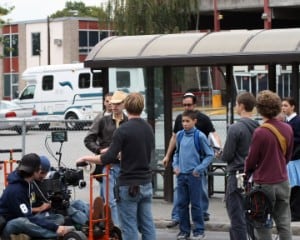 When I was eleven, I wanted to be a doctor. At seventeen, I had no idea. I had some fun in high school chemistry, so at university I majored in it, but it was a non-starter. I found myself craving sun light and fresh air too often during long chemistry labs. I didn’t know why I thought finance would be any better, but it was the early 2000’s and finance was all the rage.
When I was eleven, I wanted to be a doctor. At seventeen, I had no idea. I had some fun in high school chemistry, so at university I majored in it, but it was a non-starter. I found myself craving sun light and fresh air too often during long chemistry labs. I didn’t know why I thought finance would be any better, but it was the early 2000’s and finance was all the rage.
It wasn’t until I became disillusioned with finance that I started searching for something that fit me rather than some whim or fad. It was really through my exposure to Metropolis Films, Stephen Ryder’s production company, and Turner Classic Movies that I started to gravitate back to movies.
Things really started to cascade together while watching High Sierra, an old Humphrey Bogart movie. I connected with it in a way where I saw the film more comprehensively. For the first time, I observed the infinite possibilities to stage any given scene and the vast number of choices made to transform them into the movie on the screen. Raoul Walsh, the director, was a important part of that whole process. It was a wild ride I wanted to replicate.
 I sought advice from Stephen Ryder, my Godfather. He suggested, if I wanted to be a director, I should make a short film as a test run of my resolve. I agreed. He came up with the idea for Ahmed and I jumped at it, because it was the unique and compelling story of a Palestinian family with a universal underlying theme that all audiences could relate to. I found that I could handle the tremendous stress of putting together a film, but I still wasn’t sure directing was right for me. It wasn’t until we were filming that something clicked – a calm I had never experienced before came over me. I felt at home. It was one of the most enjoyable experiences of my life.
I sought advice from Stephen Ryder, my Godfather. He suggested, if I wanted to be a director, I should make a short film as a test run of my resolve. I agreed. He came up with the idea for Ahmed and I jumped at it, because it was the unique and compelling story of a Palestinian family with a universal underlying theme that all audiences could relate to. I found that I could handle the tremendous stress of putting together a film, but I still wasn’t sure directing was right for me. It wasn’t until we were filming that something clicked – a calm I had never experienced before came over me. I felt at home. It was one of the most enjoyable experiences of my life.
TheSkyKid.com : Can you tell us about how you actually made Ahmed?
Rick Lancaster: For a short film, you have to do everything you would do for a feature, but just on a smaller scale. Once Stephen came up with the premise for Ahmed, we were able to build the film around it. I researched film production. Stephen hired the cast and crew. He found an actual family to play the family. I scouted locations. It was tricky shooting Poughkeepsie, New York for Israel. Two things we couldn’t have anywhere in the film were red bricks and autumn leaves. For the interiors, we replaced all the doors with curtains. Aric Jacobson, the cinematographer, artfully lit each scene to mimic sunlight in the Middle East. We shot it with an Arriflex SR3 on super 16mm film. The footage was transferred to digibeta then ingested into Final Cut Pro to be edited.
![]()
TheSkyKid.com: Since Ahmed, most of the films you have directed have been written or co-written by Stephen Ryder (who wrote one of the most acclaimed independent films in the US –L. I. E.). What was like to work with Mr. Ryder?
Rick Lancaster: It’s very rewarding to work with Stephen. He’s a great teacher. I’ve learned a tremendous amount about telling stories and making movies from working with Stephen. He doesn’t hold anything back, which stung when his appraisal was negative, but was important to the artistic integrity of the operation.
TheSkyKid.com: Do you think there’s more mainstream acceptance of you now as a filmmaker?
Rick Lancaster: It remains to be seen how the mainstream will receive The Last Days of April.
TheSkyKid.com: What was the most difficult thing about shooting The Last Days of April?
Rick Lancaster: The shooting schedule. The order in which the scenes would be filmed during production was by far the most difficult aspect for me. We had just three weeks to shoot the entire film, where big-budget Hollywood films have many months. To further complicate matters, all the rooms to be in the film were unfinished when we started filming. At the end of most shooting days, production manager Jared Wyso and I sat down to figure which room should be decorated for the next day of shooting. As a result, the schedule was set the evening before shooting. Productions normally set the schedule weeks ahead of time. It’s a testament to the cast and crew that the production went so smoothly.
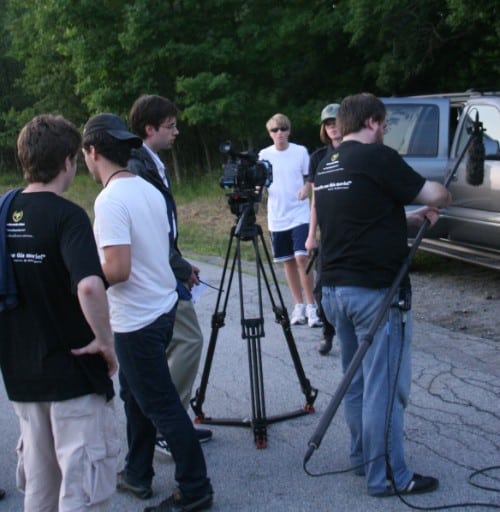
TheSkyKid.com: In the casting of the Last Days of April, what was the process like? It’s obvious that your decision on who would play the lead roles (TJ Plunkett and Brett Helsham) was integral to the movie’s success. What criteria did you use to select them?
Rick Lancaster: Finding the right actors is probably the single most important aspect of moviemaking.
We had only four weeks to cast the entire film — it was nerve-wracking. The first step, look over the head shots of the prospective actors, those we believed look right for their roles. Then those were called in for auditions. It was paramount that each actor be believable in his/her character.
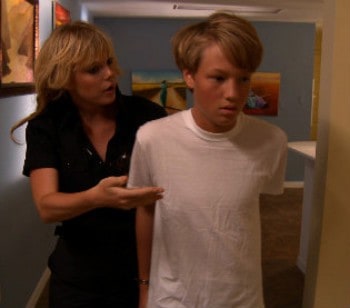 We knew, from the beginning, the challenges in finding a 14-year-old boy to play the male lead, Zack Butterfield. Epic searches for boys to fill starring roles are things of Hollywood lore. On Empire of the Sun, Steven Spielberg searched all over the world for a boy to play the lead. It wasn’t until Amy Irving recommended a talented young actor, 13 year-old Christian Bale (who she had just worked with on Anastasia: The Mystery of Anna) that the role was filled. For Billy Elliot, over four thousand boys auditioned to play the lead before Stephen Daldry decided on Jamie Bell.
We knew, from the beginning, the challenges in finding a 14-year-old boy to play the male lead, Zack Butterfield. Epic searches for boys to fill starring roles are things of Hollywood lore. On Empire of the Sun, Steven Spielberg searched all over the world for a boy to play the lead. It wasn’t until Amy Irving recommended a talented young actor, 13 year-old Christian Bale (who she had just worked with on Anastasia: The Mystery of Anna) that the role was filled. For Billy Elliot, over four thousand boys auditioned to play the lead before Stephen Daldry decided on Jamie Bell.
Sometimes luck is all you need. TJ Plunkett was one of the first to submit for the role of Zack. We didn’t even consider him a viable candidate because we didn’t have the resources to fly him in from New Mexico. After not finding any one at the first audition, Stephen contacted TJ’s father, Tom, whom was willing to pay for all his son’s travel expenses. Stephen e-mailed me an audition video of TJ. It was apparent from the video that he was our Zack Butterfield. TJ flew in to New York for an audition, just to be sure that he and I would be able to work together. It went great. Stephen offered him the role that evening.
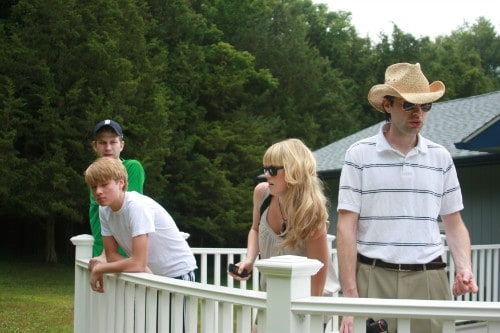
It was a huge boost getting TJ to play Zack. But, we still weren’t able to fill the rest of the roles. With just two weeks to go, we had to have something to attract the right actors to project. We turned to the Screen Actors Guild ( SAG). Having our project listed with SAG really increased the breadth of candidates submitting.
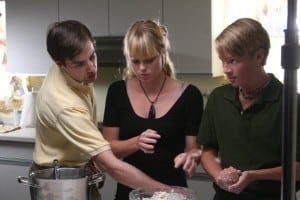 There was an in-house debate raging about April. What would make the given actor believable as a soldier? She would have to look like she would be able to handle the rigors of war. When it came to Brett Helsham auditioning for April, I was struck by her amazing emotional range, which would be invaluable for the dramatic mood swings April has throughout the film. Considering the circumstances, I was very pleased with the cast of characters. They all brought something unique to the film that enhanced what was written in the script, putting on performances beyond my wildest dreams. I was especially surprised when Brett and TJ learned, in just one week, to sing and play Midnight Special on the guitar.
There was an in-house debate raging about April. What would make the given actor believable as a soldier? She would have to look like she would be able to handle the rigors of war. When it came to Brett Helsham auditioning for April, I was struck by her amazing emotional range, which would be invaluable for the dramatic mood swings April has throughout the film. Considering the circumstances, I was very pleased with the cast of characters. They all brought something unique to the film that enhanced what was written in the script, putting on performances beyond my wildest dreams. I was especially surprised when Brett and TJ learned, in just one week, to sing and play Midnight Special on the guitar.
![]()
TheSkyKid.com: Most of the films you direct have a controversial storyline. Do you think this attracts more attention to them or do you think that the controversy in the films hurts their distribution a bit?
Rick Lancaster: Low-budget independent films don’t have the budgets to implement effective nationwide promotion campaigns. They are obliged to attract attention in other, more creative ways. This can be accomplished in many ways, such as with controversy and/or a truly unique premise (think L.I.E. and The Blair Witch Project).
 TheSkyKid.com: Ever since I published the interview with Ricky Rodriguez, the young star from your film, Muchacho Del Flamenco (currently in production), there has been a huge interest towards the film. Could you update us on the filming process? When can we expect its release?
TheSkyKid.com: Ever since I published the interview with Ricky Rodriguez, the young star from your film, Muchacho Del Flamenco (currently in production), there has been a huge interest towards the film. Could you update us on the filming process? When can we expect its release?
Rick Lancaster: We expect to start production in the beginning of 2011. A release date has yet to be set.
TheSkyKid.com: Your IMDb profile shows a film called Kandahar Knights under the “other works” section, yet no more information was listed. Could you please share some information about it?
Rick Lancaster: Kandahar Knights is a contemporary spy thriller. Stephen and I are updating and reworking his script at the moment.
![]()
TheSkyKid.com: With The Last Days of April already gaining stirring acknowledgment, and a buzz of controversy, what’s next for you?
Rick Lancaster: I’m working with Stephen, as a co-producer, prepping Muchacho del Flamenco for production. Also, we’re finishing up the script for The Long Black Veil, which is a gothic mystery tale set in 1967 Louisiana. It’s probably the most controversial thing Stephen has written since L.I.E. Also, I might direct Kandahar Knights.
TheSkyKid.com: Let’s finish the interview with a question I always ask filmmakers. As theskykid.com mainly focuses on coming of age films, it would be interesting to know if you have a favorite coming of age film that you could recommend to the people reading this interview.
Rick Lancaster: I highly recommend Billy Elliot. It’s one of the best films about a boy’s journey to find meaning in life and a proper place in the world. Also, Varsity Blues wonderfully portrays the exciting and sometimes tumultuous time for a young man about to graduate high school.
I would like to personally thank Mr. Lancaster for agreeing to this interview, which has provided some wonderful insights into the making of his films. Having seen both Ahmed and The Last Days of April, I highly appreciate his poignant directing style and am looking forward to the release of Muchacho del Flamenco and his other future films. I also want to thank Mr. Stephen Ryder for his valuable support and advice to both me and Rick.
You might also be interested in:
Rick Lancaster ( IMDB Profile )
The Last Days of April (movie review)
Ahmed (movie review )
Ricky Rodriguez – the star of Muchacho Del Flamenco (interview)
“Muchacho Del Flamenco” – a future coming of age film (film preview)